ডব্লিউএসআইএস -এক দেশ এক রেট
Executive Summary
Ensuring internet to all people in every corner of the country is a complex task. But Bangladesh has skillfully achieved ‘One Country One Rate’ for broadband internet through deep consultation and implementation of advanced technology. The impact of this development could not reach to general people due to high price hike. For a long period of time consumers had to pay high amount for accessing internet. However, with clear prediction and foresighted decision, Bangladesh government has now brought the price of internet to an affordable range.
Objective
- Affordable internet for all
- Removing digital divide
- Ensure internet facility to the remotest corner
- Provide equal digital facility throughout the country
- Regulate the business of internet service providers along with all stakeholders
- Ensure steady revenue from internet sector for government
Results
- Affordable price of internet for all people
- A stable price for all population
- An acceptable business case for internet provider industry maintaining affordable range
- Indiscrimination between rural and urban internet price
- Maintaining same quality of internet throughout the country
Impact
- Increase of broadband internet usage
- Increase in Revenue for government
- New Business case for internet service providers along with all stakeholders in rural area
- Proper utilization of internet bandwidth throughout the country
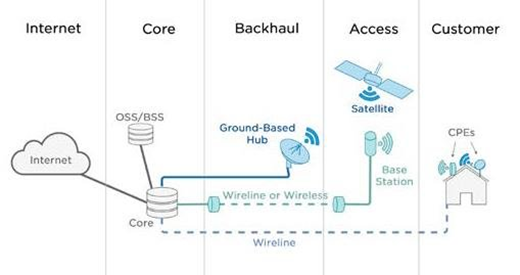
Why Government Took This Initiative
Internet is an unofficial basic need for a country. Now-a-days almost all activities are connected to internet one way or another. But to make sure internet reaches all people is the responsibility of a government. Also, the internet must be affordable. Bangladesh government faced this challenge for long time for both infrastructure and tariff. There was not enough infrastructural development to provide internet to remotest corner of the country. Fortunately, in last few years, Bangladesh government has paved the way to providing internet to rural area through massive infrastructural development conducted in different projects. But still a considerable amount of people couldn’t connect to internet for the discrimination in price. Urban area, being developed had more infrastructural and qualitative advantage than rural area. So, people in rural area mainly suffered for high price of internet. Even is urban area, prices of internet may differ with location. So not having a unified tariff was a major problem
Background
Bangladesh as a developing country is growing faster in telecommunication sector. But telecommunication can’t advance without adequate internet. Bangladesh has a considerable amount of internet speed throughout the country. Numerous of projects are being implemented to connect the unconnected. This helps to prevent the digital divide that prevails in Bangladesh.
The Department of Posts and Telecommunications and the Bangladesh Telecommunication Regulatory Commission (BTRC) are relentlessly implementing various telecommunication services including quality of services and formulating up-to-date tariffs to make the technology and telecommunication system accessible and comfortable for the people to implement Vision 2041 for Digital Bangladesh. According to the election manifesto of the present Government that is “Price of broadband and mobile internet will be brought to an affordable range” they aim to fulfill the dream of building a digital Bangladesh. For this, development of information and communication technology is mandatory. BTRC's provision of Broadband Internet for marginal customers across the country as per the instructions of the Department of Posts and Telecommunications is fueling that dream.
Without proper regulation and price cap, it would not be possible to control the price of internet. So, BTRC took steps to regulate this market to provide a clear guidance about the internet price. According to this regulation, for 5 Mbps shared internet connection, consumer will be charged at most BDT 500 ($ 5.80), for 10 Mbps shared internet connection, consumer will be charged at most BDT 800 ($ 9.28), for 20 Mbps shared internet connection, consumer will be charged at most BDT 1200 ($ 13.91). Other internet speeds can prevail according to these ratios, but base speed-price ratio must be maintained throughout the country.
To implement this, BTRC had to discuss with the internet service providers along with IIG and NTTN. About 36 meetings were conducted to convince all internet service providers along with all stakeholders. Now after implementing this tariff, consumers of any area, rural or urban, can enjoy same tariff and features throughout the country.
Difficulties for Tariff Implementation
Consumer interests were being disrupted
License conditions were not being met properly
Unequal competition and complexity were being created between different licensees
Uncontrolled business environment was being created in the chain of business
There was uncertainty in receiving foreign investment (FDI)
Lack of coordination, arbitrariness between ISP, IIG, NTTN that creates consequent customer dissatisfaction
The government was losing revenue as there were no tariff
Role of BTRC in Formulating the Tariff
On 26/04/2021, the Commission convened a 7-member Tariff Committee comprising members of various departments of BTRC, including Brigadier General Md. Nasim Parvez, NDC, AFWC, PSC, Director General (SS). The committee reviewed cost analysis of all stakeholders for all stages of delivery of broadband internet from ILDC through NTTN to IIG end, from IIG to NTTN through ISP and from ISP to NTTN to customer end.
Cost in Different Layers
The formed committee has collected, discussed, reviewed, and analyzed the information by arranging meetings with various organizations concerned with delivering internet bandwidth at the consumer level with a view to fixing the tariff of broadband internet for the marginal stage. This includes reviewing the bandwidth purchases from ILDC operators, NTTN transmission costs and other costs including purchasing bandwidth from IIGs, all costs of operating ISPs including NTTNs, and access to the Internet at the customer's end. The following figure provides an information to consider up to the customer end:
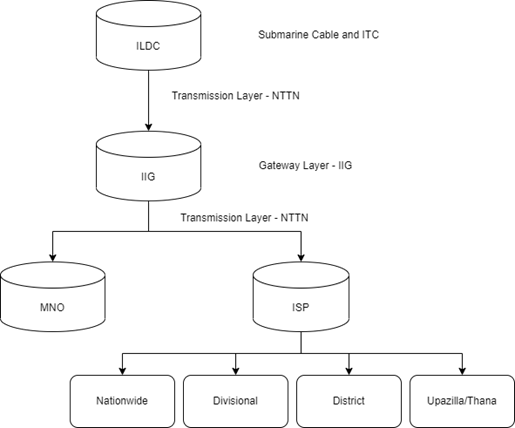
Meetings
Committee meetings were held with all concerned (ILDC, BTCL, PGCB, Bangladesh Railway, ISPAB, IIGAB) to reach the Internet subscriber level. In this case, a total of 36 (36) meetings were held on different dates with different organizations as per the schedule.
Steps Taken by the Committee
The Tariff Committee constituted by the BTRC, after considering all the matters pertaining to the scope of work as per the 'Office Order', takes necessary action in each case and completes the tariff formulation activities. The details of the activities carried out according to the scope of work at different stages are as follows:
- Collection of various Internet packages costs from ISPs, the purchase price of bandwidth obtained from IIG and the cost of transmission from NTTN.
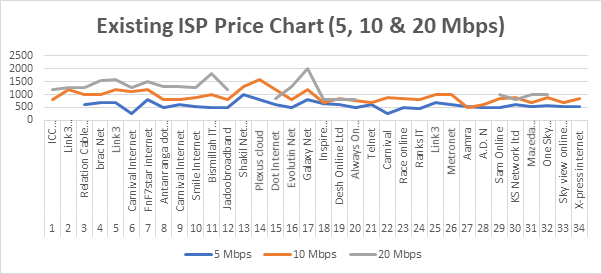
- Collection of information on the purchase price of bandwidth obtained from BSCCL / ITC from IIG and the cost of transmission provided to NTTNs.
- Collection of data from NTTNs for transmission of bandwidth to ISPs at different prices.
- Collection of information related to various cost components from ISPAB, IIGAB and all NTTNs.
- Collection and analysis of all existing market price of ISP, IIG and all NTTNs from customers / institutions / organizations.
- Collection and analysis of current pricing information of all government NTTN / IIG / ISPs.
- Price analysis of recommended internet bandwidth for all unions at customer level under Info-Sarkar-3 project.
- To get the consent of the concerned ISPAB to provide internet services at the same price at all marginal levels across the country.
- Meeting with all concerned, discussion, analysis, evaluation, taking recommendations and obtaining consent from the concerned organization regarding tariff setting.
- Fixing a reasonable and acceptable tariff.
- Consent of acceptance from all stakeholders for implementation of tariff.
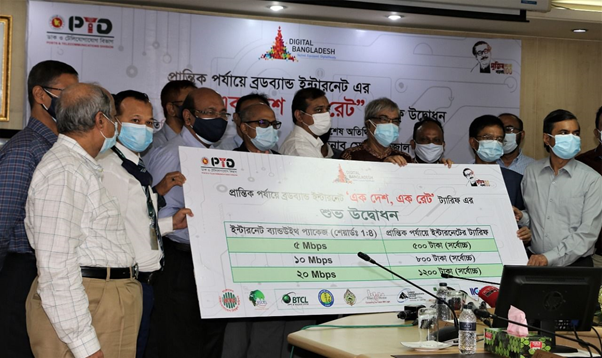
Figure: Inauguration of the One Country One Rate Tariff for Broadband Internet
One Country, One Rate Tariff
Tariffs for all types of ISPs across the country are approved by the Department of Posts and Telecommunications when the draft tariff prepared by the BTRC committee for data collection, encryption, analysis, review, consent of all parties and consideration of consumer interests is sent to the government for approval.
|
Bandwidth (Minimum) |
ISP Tariff, BDT/Month |
|||
|---|---|---|---|---|
|
Maximum Shared (Contention Ratio) 1:8 |
Metro |
District |
Upazilla/Thana |
Union |
|
5 Mbps |
500 (Maximum) |
500 (Maximum) |
500 (Maximum) |
500 (Maximum) |
|
10 Mbps |
800 (Maximum) |
800 (Maximum) |
800 (Maximum) |
800 (Maximum) |
|
20 Mbps |
1200 (Maximum) |
1200 (Maximum) |
1200 (Maximum) |
1200 (Maximum) |
Issues Considered While Fixing One Country, One Rate Tariff
Cost Component Analysis or justification of each piece of information has been taken, verified, and presented.
Data provided from BTCL is considered along with ISPAB data.
Tariffs fixed for customers at the union level regarding Info-Sarker-3 have been considered.
Package information / leaflets of various ISPs have been collected to consider the market value.
Floor / Ceiling and all conventional tariffs have been considered for the whole of Bangladesh.
The introduction of one rate tariff has been given priority for whole Bangladesh.
Considering the broadband policy, with the consent of ISPAB, the speed will be a minimum of 10Mbps with effect from 16/12/2021.
The concentration ratio is set at a maximum of 1:8.
Grade of Service (GoS) has been formulated to enhance the quality of service.
Media Coverage
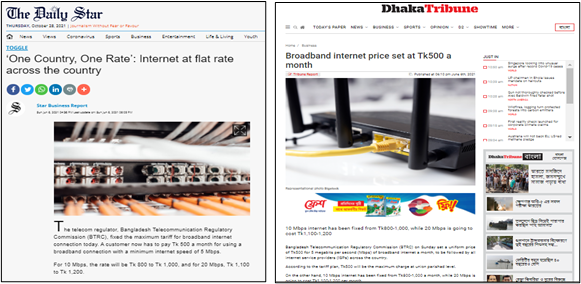
Benefit of this Tariff
Interests of the customer will be ensured.
Internet facility will be ensured at a price lower than the market price for all customers.
Each ISP shall be obliged to maintain a 'Grade of Service (GoS)', ensure Quality of Service including provision of 'Penalty' conditions which will ensure the quality of customer service
Digital divide will be eliminated; the Internet will reach the consumer end at affordable prices across the country.
The conditions of the license shall be duly maintained.
An uncontrolled business environment will not be created within the chain of business.
Will facilitate future business planning.
Receipt of Foreign Investment (FDI) will not be uncertain.
Elimination of inconsistencies, arbitrariness, and customer dissatisfaction regarding ISPs, IIGs and NTTNs.
Government revenue will be ensured
Elimination of inequal competition and complexity between different licensees.
Positive Effect of One Country One Rate
- Multi stakeholder approach
In this initiative, Bangladesh government i.e., BTRC discussed with representatives of IIG, NTTN and ISP thoroughly and published the tariff. It should be noted that convincing of different stakeholders in chain is not an easy task. But BTRC skillfully demonstrated their negotiation power and attained a tariff that was beneficial for the mass people. With this multi stakeholder approach, BTRC ensured that a tariff can be established with the help of relevant sector.
- Consultation with all the stakeholders
Before fixing one rate for the whole country, BTRC consulted with the stakeholders of IIGs, NTTNs and ISPs. 36 meetings were carried out to convince all stakeholders to mutually agree to a rate that was beneficiary to all.
- Digital divide between urban and rural and rich and poor
This initiative gradually removed the digital divide that prevailed in urban and rural areas. Also, the affordability of internet has increased so both rich and poor have access to internet.
- Social inclusion and connecting society
All people of the society can now avail internet in an affordable price. This increases social inclusion and society is more connected than before.
- Distribution of governmental services
With fixation of tariff, use of internet will spread and increase in overall areas. Earlier all government services were limited only to urban areas. Government can now distribute their services online in different locations. Now, with this initiative, people have access to affordable internet and government can provide equal facilities with distributed service by installing multiple servers throughout the country.
- Digital growth
With this initiative, use of internet will increase and thereby cost will be lower. In fact, cost of internet will lower. With the increase of usage, Bangladesh will be enriched digitally. People will be more accustomed to taking digital services such as, apply to different services online, acquire digital pdf copies of different contents rather than physical hard copies etc. This will overall contribute to the digital growth of Bangladesh and fulfil the dream of Digital Bangladesh.
- Affordability
As internet price is fixed, people from every corner of the country can now access the internet at an affordable price.
- Global village
With the increased use of internet, people will be connected with the world activities. They will come to know the global development. People of rural and urban areas will be able to take part in the development process. This will allow everyone to be a part of global village. But to become a part of this popular concept, one need to be connected to the internet and take part in necessary activities. With this initiative, people of Bangladesh can actively participate through internet and become a proud member of global village.
- Quality education
Education is a crucial and prime need for a country. Without properly education it’s population, a country can’t develop. In these covid pandemic times, the whole world faced a challenge of connecting with the world through internet. Bangladesh was no exception. But connecting to online is not easy in rural areas for high price. For this reason, students from rural area couldn’t always connect to internet and get proper classes. This initiative will ensure that the price of the internet remains same throughout the country and our future generation can get the education they need without interruption.
- Effect in the supply chain
The data moves from Submarine Cable Company to IIG, then to ISP and finally to Customers. Now, as the rate of ISP is fixed, the whole supply chain will be formulated in such way that there is no chance of single entity getting most benefit. All entities will share the benefit at a limited range and provide services to their clients with highest quality.
- Saving costs
Most people in rural area live below the average wealth line. Though internet is a prime need specially in this covid times, most of them could not afford this for high price in rural areas. Bangladesh government took this issue into notice and through complex discussions, set up a tariff for the internet. Now, accessing internet is not costly anymore. People can affordably access the internet even in rural areas. For example, if internet costed for a household in rural area for 800 BDT, it would now cost for 500 BDT. So, around 37.5% savings per connection is made. An estimated cost saving for the whole country –
|
No of Connections (in million) |
Saving (BDT) |
BDT Saving (in million) |
USD Saving (in million) |
|---|---|---|---|
|
2.14 |
300 |
642 |
7.64 |
This savings can be used in fulfilling other necessities of their life. So overall development of life in the people of rural areas can be observed through this visionary initiative.
- Better Business Case for Service Providers
Service providers will have more revenue as number of users will increase. So, they will be able to provide a better-quality service even in rural areas. A usage and revenue prediction can be seen in the following table:
|
Connection Type |
No of Connections (in million) |
User per connection |
No of Users (in million) |
Average Charge (BDT) |
Revenue (BDT in million) |
|---|---|---|---|---|---|
|
Fixed Home |
2.14 |
5 |
10.7 |
800 |
1712 |
|
Fixed Corporate |
0.1 |
20 |
2 |
8500 |
850 |
Increase in Internet Usage
The declared rate was in effect from September 01, 2021. With this rate in implementation, a significant increase in broadband internet usage was observed. The following diagram shows the increase in internet subscriber from May 2021 to November 2021 (Statistics were taken from BTRC website).
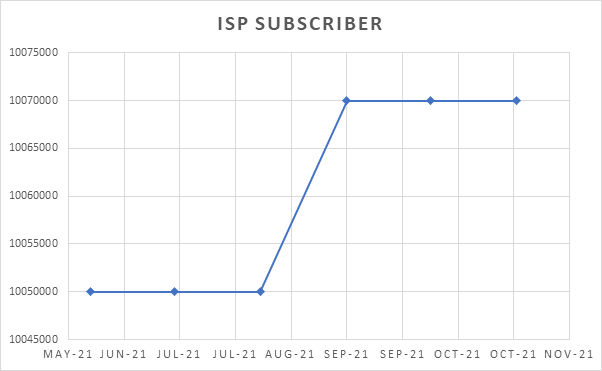
Promoting WSIS Values
This initiative contributes a lot to promote WSIS values in Bangladesh. The tariff aims to develop the connectivity and digitalization in telecommunication sector of Bangladesh. Along with this initiative people of Bangladesh will have access to affordable internet. WSIS aims to revolutionize the growth of information and telecommunication of a country through government and all stakeholders working together. This formation of internet tariff does exactly as the expectation of WSIS. This initiative paves the way for the growth of the information and communication of our country. Encouraging people to be connected and working to make internet affordable, “One Country One Rate” promotes the WSIS values in our community.
Connection with WSIS
This initiative can be included in WSIS action line C1. The role of governments and all stakeholders in the promotion of ICTs for development. This initiative –
Has developed a national plan for tariff
Was deployed at national level
Involved all relevant stakeholders
Takes people need into account
Mechanism initiated in national level
Increases use of internet
Ensures that people can avail internet with affordable price
Encourages stakeholders to provide facility to mass people
Connection with SDG
Goal 3: Good Health and Well Being
Current world in solely dependent on internet. In these covid times, internet has become one of the prime needs of mass people. People can get health and well-being updated tips easily from internet by telemedicine services. Earlier, the rural people suffered more from health issues due to unaffordable internet price. With this initiative, rural people can also be concerned and aware about health issues with proper uses of internet.
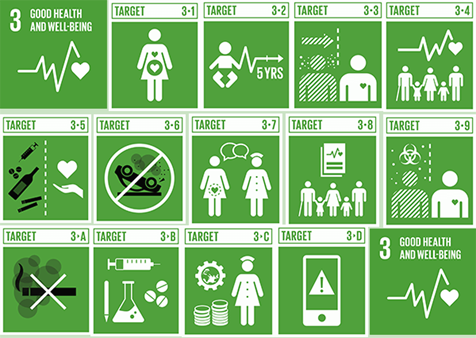
Source:https://www.euro.who.int/__data/assets/image/0020/392042/SDG3-600-collage.png
Goal 5: Gender Equality
Earlier women were less knowledgeable about the various facilities provided by the government. But with this initiative, women now will be updated of all government facilities available for them. For this, women, who are thought of falling behind, can also acquire the knowledge and skills needed to lead equally in this competitive world.
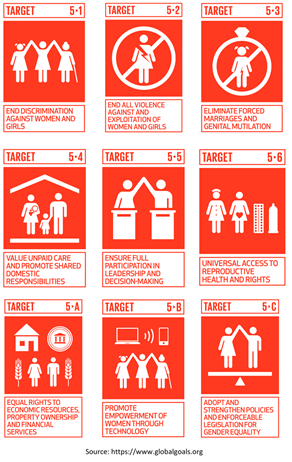
Goal 10: Reduced Inequality
This initiative covers this goal more than others. This initiative will reduce the inequal distribution of resources and works to reduce the digital divide. Implementing this initiative, government can ensure that people can connect to the rest of the world as equally as the urban area. So, working to reduce the inequal internet facilitation is a prime fulfilling of this initiative.
Goal 17: Partnership to Achieve the Goal
This initiative brings all stakeholders under the same hood to provide a standard rate for general people. Through this partnership, industry has a say in policy making and at the same time they can contribute for the betterment of the country.
Challenges
Initially every new thing faces some difficulties while implementation. This initiative in not an exception. Some challenges regarding this initiative are –
Government has declared the tariff for whole country, but to implement it in micro level still needs time
Less number of users in rural areas
Business not viable for price difference of urban and rural broadband internet
Some unregistered internet service providers will remain throughout the country, who may not follow the tariff
Many people in Bangladesh are not yet literate to ensure their rights. Unawareness of the internet tariff may sometimes cost them over payment in internet usage.
There might be some complicacy in designing bundled packages offered with internet such as value-added services, OTT etc. ISPs may find it difficult to design new packages initially.
Steps Taken to Mitigate the Challenges
Making balance between urban and rural internet prices
For fixing tariff, revenue earning from internet in rural area will increase gradually, so business will be viable in future
Conclusion
Over the past 25 years, customers were suffering due to not having a tariff for internet. This tariff will play a vital role in maintaining a conducive environment for unresolved consumer dilemmas and internet business, and in implementing the current government's election manifesto. Setting "one country one rate" will give marginal customers access to internet services at a fixed price and will increase the rate and quality of broadband internet users.
Views on WSIS Stocktaking and Prizes Contest
WSIS Stocktaking and Prize will be an inspiring achievement for the Government of Bangladesh. It will be a critical platform to spread the scope of our work to the other countries of the world. It is hoped that the impact of this initiative will be known and applied far from the geographical limits of Bangladesh.
About: BTRC
Bangladesh Telecommunication Regulatory Commission (BTRC) an independent Regulatory Commission established under the Bangladesh Telecommunication Act, 2001, (Act no18 of 2001) published by the parliament in the Bangladesh Gazette extraordinary in new on April 16, 2001. BTRC started his journey from 31st January 2002 to conduct the activities of the said act. According to the Telecommunication act, the Commission is assigned with various responsibilities. Out of those, establishing, operating, regulating, maintaining telecommunication establishments and providing various telecom services in the country are the major ones. Besides, fixing charges on the subscribers, ensuring the services for the subscribers and to ensure people’s right are also tasks of BTRC. The social and economic behavioral pattern of the telecom service providers are also monitored by the BTRC to ensure that the users are not subjected to harassment and not indifferent in nature.




